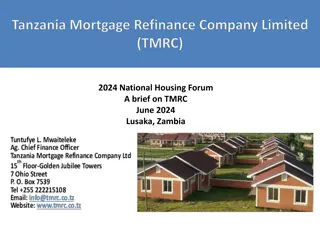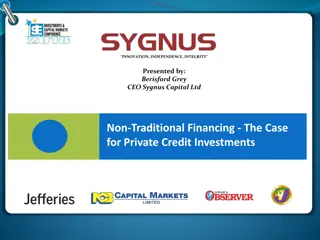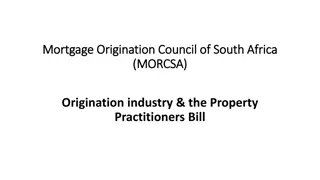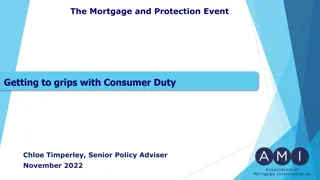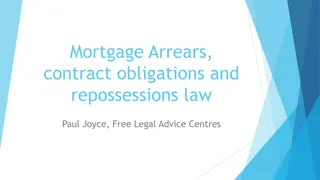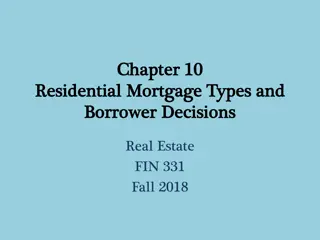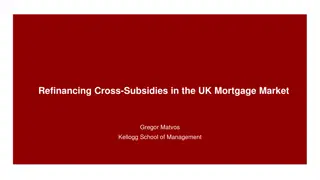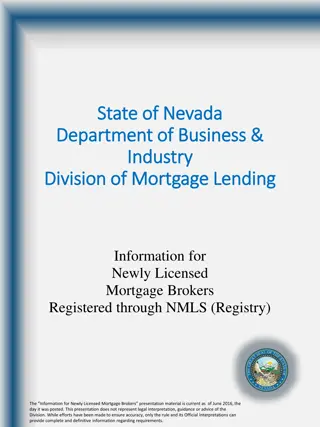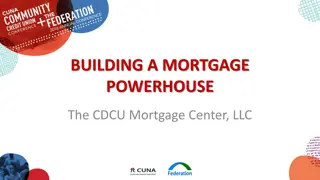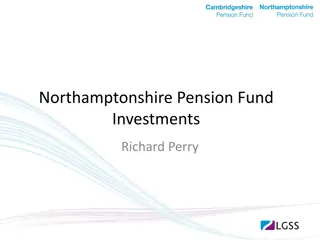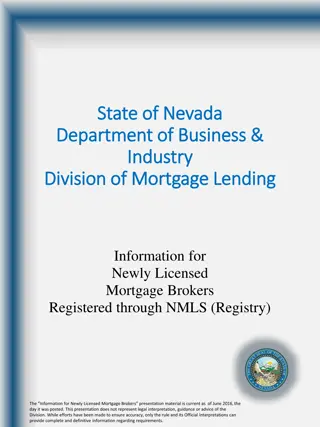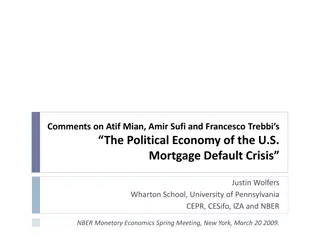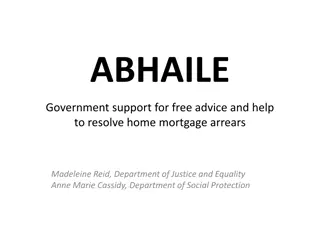Understanding Syndicated Mortgage Investments: Key Information and Regulations
Syndicated Mortgage Investments (SMIs) involve multiple lenders participating in a mortgage, with distinctions between Qualified SMIs (QSMIs) and Non-Qualified SMIs (NQSMIs). The presentation covers the definition of SMIs, requirements for QSMIs, registration processes, compliance obligations, and common queries addressed by the Ontario Securities Commission (OSC) staff. It emphasizes the limitations and oversight of QSMIs concerning lower-risk residential mortgages, excluding high loan-to-value ratios and financing for property construction or development. Compliance with securities legislation and ongoing adherence to standards are paramount in syndicated mortgage investments.
Download Presentation

Please find below an Image/Link to download the presentation.
The content on the website is provided AS IS for your information and personal use only. It may not be sold, licensed, or shared on other websites without obtaining consent from the author. Download presentation by click this link. If you encounter any issues during the download, it is possible that the publisher has removed the file from their server.
E N D
Presentation Transcript
Syndicated Mortgage Amendments Presenter: Adam Braun, Senior Advisor, Policy - Investor Office Branch Brendan Smith, Legal Counsel Compliance and Registrant Regulation Branch Webinar: March 29, 2021
Disclaimer The views expressed in this presentation are the personal views of the presenting staff and do not necessarily represent the views of the Ontario Securities Commission or any of its other staff. The presentation is provided for general information purposes only and does not constitute legal or accounting advice. Information has been summarized and paraphrased for presentation purposes and the examples have been provided for illustration purposes only. Information in this presentation reflects securities legislation and other relevant standards that are in effect as of the date of the presentation. The contents of this presentation should not be modified without the express written permission of the presenters. 1
Agenda What is a syndicated mortgage investment (SMI)? Substance of the SMI amendments Registration requirements and process Ongoing compliance obligations Common questions received by OSC staff 2
What is a syndicated mortgage investment? Syndicated mortgage means a mortgage in which two or more persons participate, directly or indirectly, as a lender in a debt obligation that is secured by the mortgage. Qualified syndicated mortgage (QSMI) is defined with an intent to limit the scope of these products to lower-risk mortgages on primarily residential property that are similar to conventional mortgages. In particular, the definition excludes SMIs that are for financing the construction or development of property, and have a loan-to-value ratio of greater than 90%. Non-qualified syndicated mortgage (NQSMI) is any syndicated mortgage that does not fall into the definition of QSMI. In Ontario, trades of QSMIs will generally remain under the oversight of the Financial Services Regulatory Authority of Ontario (FSRA). 3
What is a syndicated mortgage investment? QSMI means a syndicated mortgage that satisfies all of the following: a) the syndicated mortgage secures a debt obligation on property that satisfies all of the following: i. it is used primarily for residential purposes; ii. it includes no more than four units; iii. it includes no more than one unit that is used for non-residential purposes; b) the syndicated mortgage does not secure a debt obligation incurred for the construction or development of property; c) at the time the syndicated mortgage is arranged, the amount of the debt it secures, together with all other debt secured by mortgages on the property that have priority over, or the same priority as, the syndicated mortgage, assuming in all cases that the maximum amounts of any such mortgages are fully drawn, does not exceed 90 per cent of the fair market value of the property relating to the mortgage, excluding any value that may be attributed to proposed or pending development of the property; d) the syndicated mortgage cannot be subordinated to future financing without the consent of each lender; e) there is no existing agreement that requires any lender of the syndicated mortgage to consent to future subordination of the syndicated mortgage; f) no person has the ability to consent to future subordination of the syndicated mortgage on behalf of the lenders of the syndicated mortgage without obtaining the consent of each lender 4
What is a syndicated mortgage investment? Ontario currently has dealer registration and prospectus exemptions for the trading of mortgages if they are sold by a mortgage broker licensed or exempt from licensing in the jurisdiction where the property is located in Canada. The amendments will limit the use of these exemptions where the mortgage being traded is a syndicated mortgage. The amendments are expected to come into effect in Ontario on July 1, 2021. 5
Background There has been a significant increase in the offering of SMIs in connection with real estate developments in Ontario. These offerings potentially raise investor protection concerns, particularly when sold to retail investors, because they may: be used to raise seed financing for real estate developments, such as the costs of initial design proposals and start-up expenses; be sold based on projected values of a completed development; not be fully secured by a charge against real property, since the amount of the loan may significantly exceed the current fair value of the land; be subordinate to future financings, such as construction financing, which may be substantial and effectively render the investment more similar in risk to an equity investment rather than a fixed income investment; be offered by issuers with no source of income, rendering the payment of ongoing interest dependent on future financing or reserves from the principal advanced; and be subject to the risk of delay and increased costs inherent to real estate development. 6
Summary of the SMI amendments Remove the existing dealer registration and prospectus exemptions for trades of SMIs in Ontario, except in certain circumstances. Issuers that distribute SMIs through the offering memorandum (OM) prospectus exemption will need to deliver additional information to investors including an appraisal and Form 45- 106F18 Supplemental Offering Memorandum Disclosure for Syndicated Mortgages (Form 45-106F18). The private issuer prospectus exemption will be unavailable for the distributions of SMIs. 7
Registration and prospectus requirements After the amendments come into force, all firms in the business of trading SMIs will need to be registered as dealers. In addition, all SMI distributions must comply with the prospectus requirements or rely on another available prospectus exemption. There remains a dealer registration and prospectus exemption for distributions in respect to any of the following: a) a mortgage, other than an SMI, on real property in a jurisdiction of Canada, b) a QSMI on real property in a jurisdiction of Canada, or c) a syndicated mortgage on a real property in a jurisdiction of Canada with a permitted client, and the distribution is conducted by a person that is registered or licensed under the Mortgage Brokerages, Lenders and Administrators Act, 2006. 8
Registration and prospectus requirements Summary of regulatory oversight after the amendments come into force: Mortgage (not an SMI) FSRA QSMI NQSMI Permitted Clients only Non-permitted clients FSRA FSRA FSRA FSRA OSC This chart assumes the firm is appropriately licensed as a mortgage brokerage in order to rely on the dealer registration and prospectus exemptions. 9
Offering memorandum prospectus exemption Must provide the current fair market value of the property by a qualified and independent appraiser. Restrictions on providing any other value other than the appraised fair market value. Delivery of the appraisal to the OSC at the same time the OM is delivered. All of the information in Form 45-106F18 must be included in the OM, including but not limited to: Risk factors specific to syndicated mortgages; Administration of the mortgage; Property subject to the mortgage; Information on the developer(s) of the property; and Conflicts of interest between the mortgage broker, borrower, mortgage administrator, developer and other parties. 10
Private issuer prospectus exemption Not available for the distribution of SMIs. 11
Registration requirements and process National Registration Database (NRD) - https://www.nrd.ca/ Form 33-109F6 Firm Registration (Form 33-109F6) https://www.osc.ca/en/filing-documents-online Form 33-109F4 - Registration of Individuals and Review of Permitted Individuals (Form 33-109F4) The form must be submitted for each of the following individuals: The ultimate designated person The chief compliance officer Every dealing representative Each director The CEO, CFO, COO (or equivalent) Any individual who directly or indirectly owns or controls 10% or more of the firm 12
Registration requirements and process Ultimate designated person (UDP) supervise the activities of the firm that are directed towards ensuring compliance with securities legislation by the firm and each individual acting on the firm's behalf; and promote compliance by the firm, and individuals acting on its behalf, with securities legislation. Chief compliance officer (CCO) establish and maintain compliance policies and procedures; monitor and assess compliance by the firm, and individuals acting on its behalf; report to the UDP if aware of any non-compliance with securities legislation; and submit an annual report to the firm's board of directors (or equivalent) 13
Registration requirements and process Dealing representative (DR) Must be registered in order to trade in any securities, including SMIs. trade includes any act in furtherance of a trade. Proficiency requirements All registered individuals must have the education, training and experience to perform their role competently. UDP must be the CEO (or equivalent) of the firm. CCOs must be able to demonstrate 12 months of relevant securities industry experience and complete certain examinations. CSA staff may consider compliance experience obtained at a mortgage brokerage to be relevant DRs must complete certain examinations. 14
Registration requirements and process OSC service commitment is to provide a decision on new, routine business applications within 90 business days of receiving a complete and adequate application. Filing fees are associated with NRD and filing of both Form 33- 109F6 and Form 33-109F4 Fees payable to the OSC are found in OSC Rule 13-502 Fees. 15
Ongoing compliance obligations Section 11.1 of NI 31-103 A registered firm must establish, maintain and apply policies and procedures that establish a system of controls and supervision sufficient to: a) Provide reasonable assurance that the firm and its individuals comply with securities law, and b) Manage the risks associated with its business according to prudent business practices. OSC Rule 31-505 Conditions of Registration Dealers and their representatives must deal fairly, honestly and in good faith with your clients 16
Ongoing compliance obligations Policies and procedures Know-your-client (KYC), know-your-product (KYP) and suitability assessments Managing conflicts of interests Ongoing client reporting Keeping Form 33-109F6 and Form 33-109F4 up-to-date 17
Compliance reviews OSC staff regularly conduct both on-site and desk compliance reviews of registered firms to monitor compliance with securities legislation. On-site reviews are general examinations of the books, records and documents of a firm. Desk reviews are generally focussed on a specific issue of concern. OSC resources on compliance reviews: OSC website Compliance Reviews https://www.osc.ca/en/industry/registration-and- compliance/ongoing-requirements/osc-compliance-reviews November 19, 2019 Registrant Outreach - The OSC Compliance Review Process and Effective Compliance Systems https://www.osc.ca/en/news-events/events/registrant- outreach-osc-compliance-review-process-and-effective- compliance-0 18
Common questions received by OSC staff Who is the issuer of an SMI? Why is an appraisal required for SMIs? How do I hire a Chief Compliance Officer? I ve been in the mortgage business for X years - do I have to write the exams? 19
Resources National Instrument 31-103 Registration Requirements, Exemptions and Ongoing Registrant Obligations National Instrument 45-106 Prospectus Exemptions OSC Rule 45-501 Ontario Prospectus and Registration Exemptions National Instrument 33-109 Registration Information Requirements 20
Questions? 21






